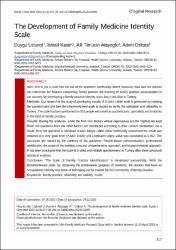| dc.contributor.author | Üstünol, Duygu | |
| dc.contributor.author | Kasım, İsmail | |
| dc.contributor.author | Atayoğlu, Ali Timuçin | |
| dc.contributor.author | Özkara, Adem | |
| dc.date.accessioned | 2023-01-27T09:15:10Z | |
| dc.date.available | 2023-01-27T09:15:10Z | |
| dc.date.issued | 2022 | en_US |
| dc.identifier.citation | Üstünol, D., Kasım, İ., Atayoğlu, A. T. ve Özkara, A. (2022). The development of family medicine identity scale. Eurasian Journal of Family Medicine, 11(4), 217-228. https://dx.doi.org/10.33880/ejfm.2022110405 | en_US |
| dc.identifier.issn | 2147-3161 | |
| dc.identifier.uri | https://dx.doi.org/10.33880/ejfm.2022110405 | |
| dc.identifier.uri | https://hdl.handle.net/20.500.12511/10385 | |
| dc.description.abstract | Aim: It is to put a scale into the use of the academic community which measures how well the doctors can interiorize the features concerning family practice the training of family practice specialization in our country, by developing a family practice identity scale that is peculiar to Turkey. Methods: Our research is the study of developing a scale. A 5-point Likert scale is generated by creating the questionnaire and then the aforementioned scale is studied to verify the validation and reliability in Turkey. The scale has been performed on 351 people who work as academicians, specialists and residents in the field of family practice. Results: During the analyses, while the first four factors whose eigenvalues are the highest are kept fixed, the questions from the other factors are distributed according to their content similarities. As a result, forty-six questions is obtained. Kaiser-Meyer-Olkin value conformity assessment the result was obtained at a very good level (KMO: 0.940) and Cronbach's alpha value was calculated as 0.952. The sub-scales are named by the contents of the questions: Patient-doctor communication, professional satisfaction, the scope of the working area and comprehensive approach, and biopsychosocial approach. It has been concluded that the scale is a valid and reliable questionnaire in Turkey after these advanced statistical analyses. Conclusion: "The Scale of Family Practice Identification" is developed successfully. With the aforementioned scale, by observing the professional progress of residents, the doctors that have an occupational identity and sense of belonging can be trained for the community of family practice. | en_US |
| dc.language.iso | eng | en_US |
| dc.publisher | Eurasian Society of Family Medicine | en_US |
| dc.rights | info:eu-repo/semantics/openAccess | en_US |
| dc.subject | Family Practice | en_US |
| dc.subject | Reliability and Validity | en_US |
| dc.subject | Scales | en_US |
| dc.title | The development of family medicine identity scale | en_US |
| dc.type | article | en_US |
| dc.relation.ispartof | Eurasian Journal of Family Medicine | en_US |
| dc.department | İstanbul Medipol Üniversitesi, Tıp Fakültesi, Dahili Tıp Bilimleri Bölümü, Aile Hekimliği Ana Bilim Dalı | en_US |
| dc.authorid | 0000-0003-4568-4234 | en_US |
| dc.identifier.volume | 11 | en_US |
| dc.identifier.issue | 4 | en_US |
| dc.identifier.startpage | 217 | en_US |
| dc.identifier.endpage | 228 | en_US |
| dc.relation.publicationcategory | Makale - Uluslararası Hakemli Dergi - Kurum Öğretim Elemanı | en_US |
| dc.identifier.doi | 10.33880/ejfm.2022110405 | en_US |
| dc.institutionauthor | Atayoğlu, Ali Timuçin | |
| dc.identifier.scopus | 2-s2.0-85146463670 | en_US |
| dc.identifier.trdizinid | 1157238 | en_US |


















